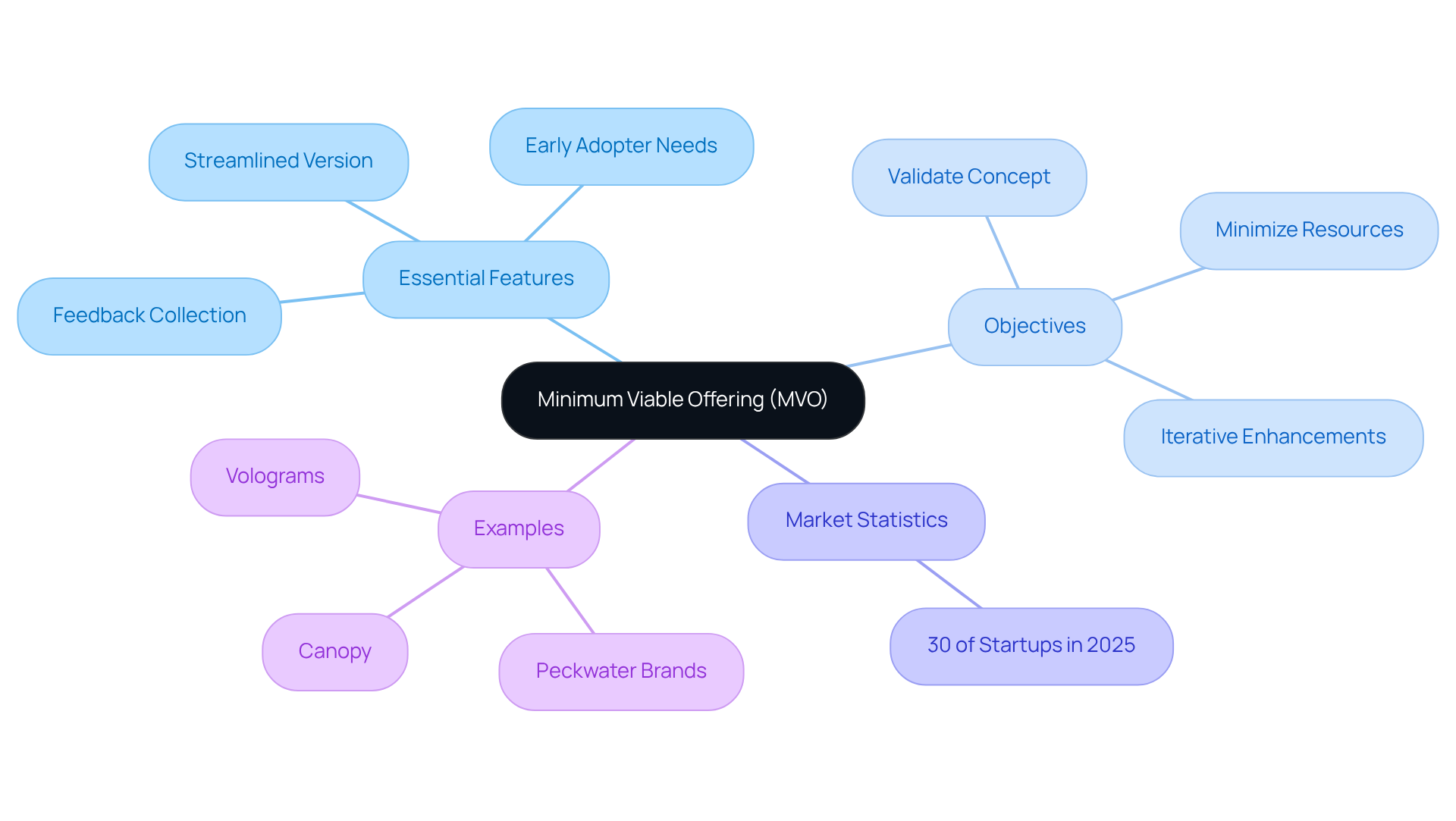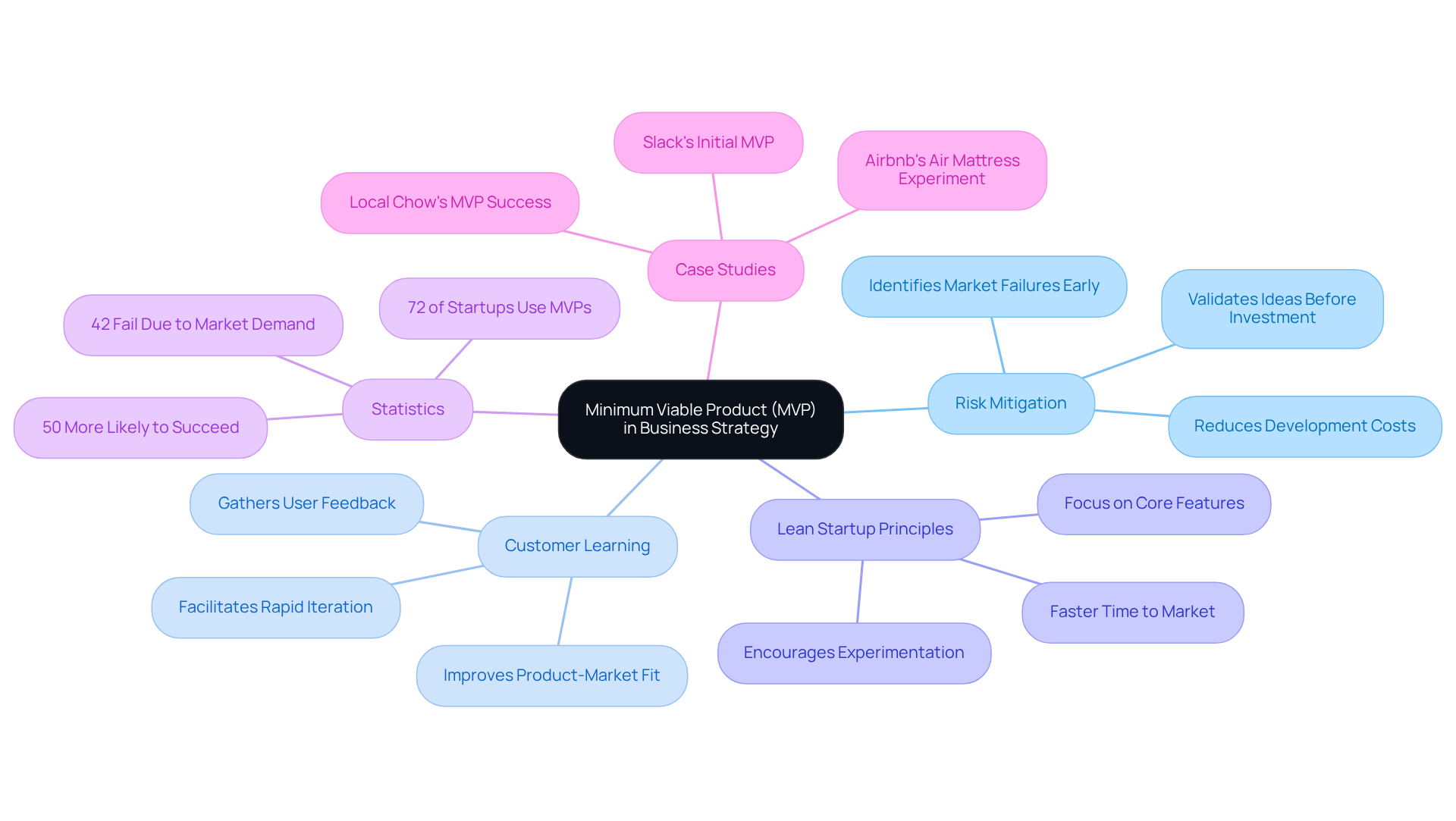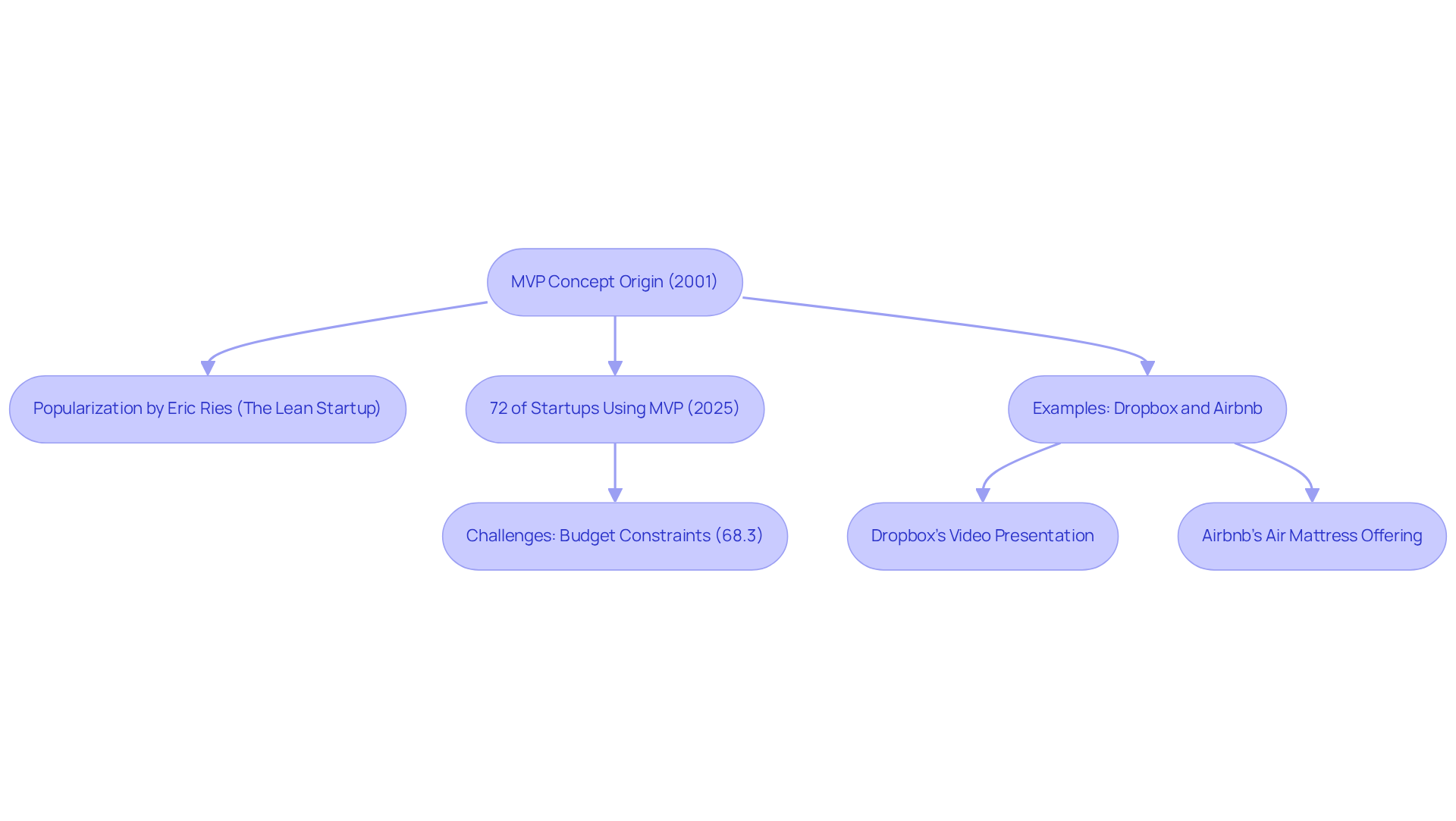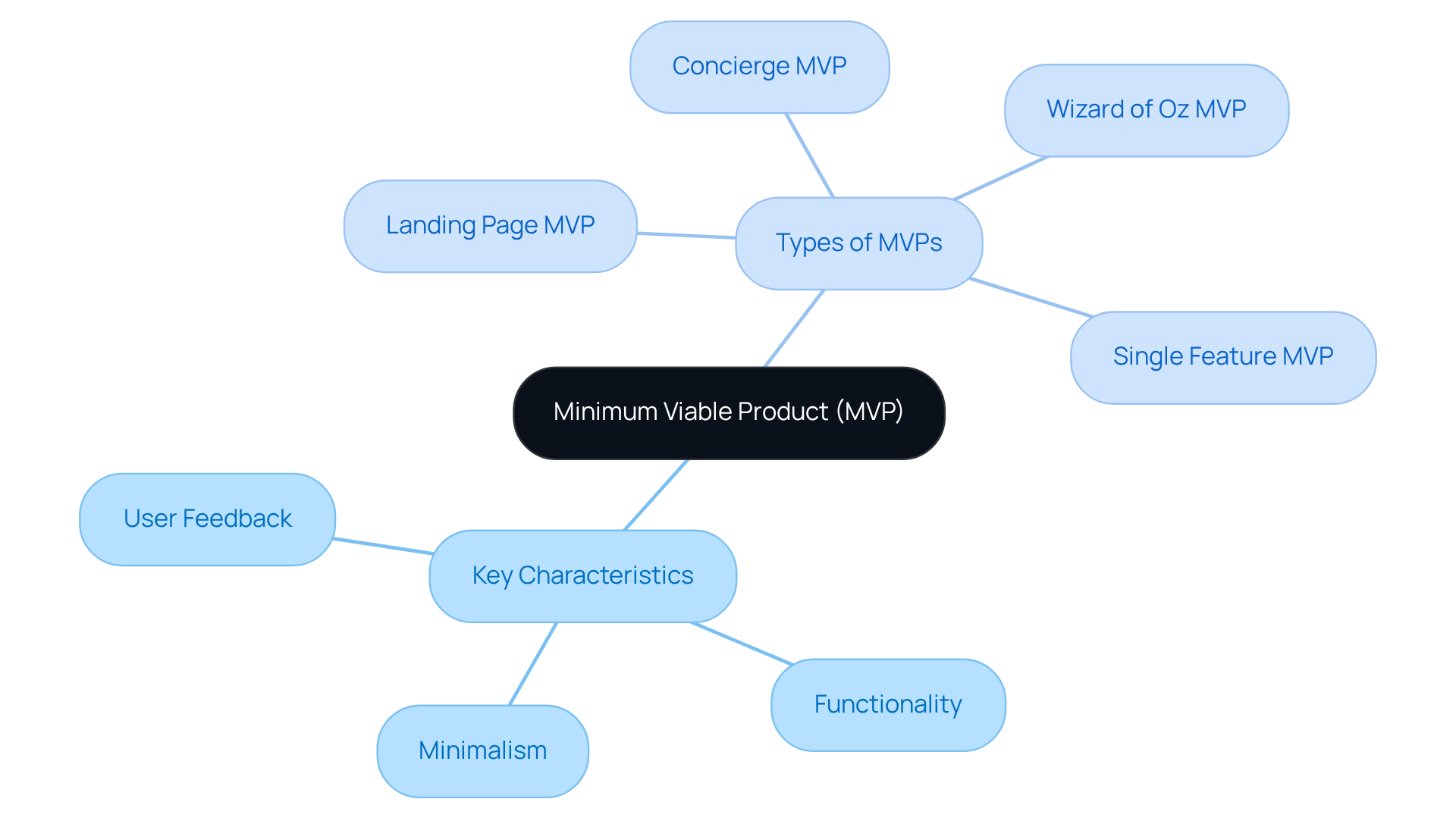AI
our blog
Understanding MVP Meaning in Business: Definition and Key Insights

Overview
The MVP (Minimum Viable Product) in business is defined as a streamlined iteration of a product that encompasses only the fundamental features essential for satisfying early adopters and collecting user feedback for subsequent enhancements. This approach is pivotal for startups, as it facilitates the validation of ideas while effectively minimizing costs and risks.
Furthermore, it aligns product development with genuine market demand, significantly increasing the likelihood of achieving sustainable success. By focusing on these core elements, businesses can strategically position themselves for growth and innovation.
Introduction
Understanding the essence of a Minimum Viable Product (MVP) is crucial for businesses navigating today's competitive landscape. This concept minimizes resource expenditure while enabling companies to validate their ideas through real customer feedback, fostering both innovation and adaptability. However, as startups increasingly embrace this strategy, a pivotal question arises: how can businesses effectively leverage MVPs to not only survive but thrive in an ever-evolving market?
Define Minimum Viable Product (MVP)
A Minimum Viable Offering (MVO) represents a streamlined version of a new creation, encompassing only the essential features necessary to meet the needs of early adopters while facilitating the collection of valuable feedback for future enhancements. The primary objective of an MVO is to validate a concept, all while minimizing resource expenditure and time commitment. By concentrating on essential functionalities, companies can efficiently evaluate their hypotheses regarding customer preferences and needs, thereby enabling iterative enhancements informed by authentic insights. This methodology is particularly advantageous in the dynamic landscape of startups, where grasping market fit is vital for achieving success.
In 2025, approximately 30% of startups are utilizing basic viable offerings in their development processes, indicating a rising trend towards flexible methodologies that emphasize client feedback and adaptability. Noteworthy projects such as Peckwater Brands, Volograms, and Canopy exemplify successful minimum viable products that have evolved into market-leading solutions, showcasing the transformative potential of focusing on essential features that deliver real value to users. As Eric Ries articulates, 'The MVP meaning in business is a version of a new offering that allows maximum validated learning about customers with minimal effort,' which underscores the significance of this approach in development.

Contextualize MVP in Business Strategy
In business strategy, the MVP meaning in business highlights the importance of Minimum Viable Products (MVPs) for mitigating risk and enhancing learning. By launching an offering with core features that appeal to early adopters, companies can gather critical insights into customer behavior and preferences. This iterative approach allows businesses to pivot or refine their offerings based on authentic market feedback rather than mere assumptions.
The MVP meaning in business is closely aligned with lean startup principles, advocating for rapid experimentation and validated learning. Notably, startups utilizing minimum viable products to evaluate pricing and value propositions reflect the MVP meaning in business, making them approximately 50% more likely to achieve sustainable revenue models.
Furthermore, research indicates that around 42% of startups fail due to insufficient market demand for their services, underscoring the necessity of minimum viable solutions in testing concepts before significant investment.
Case studies, such as Airbnb's initial provision of air mattresses at a design conference and Local Chow's minimum viable offering confirming the demand for locally sourced meals, exemplify how minimum viable concepts can direct development and validate market demand.
This strategic focus on MVPs not only reduces the risk of developing unwanted offerings but also enhances the likelihood of creating solutions that resonate with target audiences.

Trace the Origin and Evolution of MVP
The Minimum Viable Product (MVP) concept, which embodies the MVP meaning in business, was first articulated by Frank Robinson in 2001 and gained prominence through Eric Ries's influential book, 'The Lean Startup.' Initially crafted to assist startups in validating their business ideas while minimizing costs and risks, the MVP meaning in business has significantly evolved, adapting to the changing landscape of development. As of 2025, approximately 72% of startups employ the MVP methodology to enhance their products based on consumer feedback, illustrating the MVP meaning in business and its essential role in early-stage innovation. Notably, successful firms like Dropbox have demonstrated the transformative potential of well-implemented Minimum Viable Products, which exemplify the MVP meaning in business by focusing on delivering essential features and value to consumers. Dropbox validated its cloud storage idea through a straightforward video presentation, securing $1.2 million in initial funding, while Airbnb tested its home-sharing concept by providing air mattresses at a design conference in San Francisco. This historical data illustrates the MVP meaning in business, demonstrating how minimum viable products have transitioned from a startup-centric approach to a broader application in established firms aiming to innovate and respond swiftly to market demands.
The evolution of minimum viable products, which illustrates the MVP meaning in business, signifies a marked shift towards agile methodologies, emphasizing flexibility, iterative development, and responsiveness to client feedback—crucial elements for maintaining a competitive edge in today’s fast-paced business environment. Companies that prioritize speed in MVP development are 1.5 times more likely to experience revenue growth, highlighting the advantages of agile methodologies. However, businesses face challenges when implementing minimum viable products, with budget constraints being a significant hurdle for 68.3% of companies in this endeavor. As Eric Ries aptly stated, the MVP meaning in business is 'the fastest way to start learning,' which reinforces the significance of this approach within the entrepreneurial landscape.

Identify Key Characteristics and Types of MVPs
The mvp meaning in business is reflected in the key characteristics of a Minimum Viable Product (MVP), which include minimalism, functionality, and a strong emphasis on gathering feedback from users. An MVP should prioritize delivering the core value proposition, effectively minimizing unnecessary features. There are several distinct types of MVPs, each serving a specific purpose in the product development lifecycle:
- Landing Page MVP: A straightforward webpage designed to highlight the concept and generate interest through user sign-ups.
- Concierge MVP: A manual version of the offering, where services are delivered directly to users, allowing for concept validation prior to automation.
- Wizard of Oz MVP: An offering that appears fully operational but is actually managed behind the scenes by a person.
- Single Feature MVP: A solution that focuses on delivering one essential feature to evaluate its market viability.
Each type of MVP, reflecting the mvp meaning in business, plays a crucial role in enabling businesses to test hypotheses and gather valuable insights effectively, ultimately guiding strategic decision-making.

Conclusion
The concept of a Minimum Viable Product (MVP) is pivotal in the business landscape, serving as a crucial strategy for startups and established companies alike. By focusing on essential features that meet the immediate needs of early adopters, businesses can minimize risk and maximize learning. This approach not only streamlines the development process but also ensures that offerings are aligned with genuine customer demands, leading to more informed and successful product iterations.
Throughout the article, the importance of MVPs has been underscored through various examples and insights. From the historical context provided by pioneers like Eric Ries to the practical applications seen in successful companies, it is evident that MVPs facilitate a dynamic feedback loop that enhances product relevance. Key characteristics, such as minimalism and functionality, along with different types of MVPs, have been explored to illustrate how they serve distinct purposes in the product development lifecycle.
In conclusion, embracing the MVP methodology is essential for any business aiming to thrive in a competitive environment. The ability to test and validate ideas quickly not only reduces the risk of failure but also fosters innovation driven by real customer insights. Companies are encouraged to adopt this agile approach, leveraging the MVP framework to ensure that their products resonate with target audiences and ultimately drive sustainable growth.









